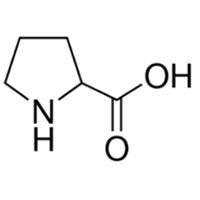Product Description
DL-Proline is a non-essential amino acid that is widely used in both the chemical and food industries.
It is an important building block for proteins and plays a critical role in many physiological processes
in the body.
As a chemical product, DL-Proline is primarily used as a precursor for the production of other important
chemicals and drugs. It is also used in the production of synthetic resins, plastics, and other
industrial materials.
In the food industry, DL-Proline is used as a food additive and dietary supplement. It is commonly used
to enhance the texture and stability of foods, especially in processed meats and cheeses. It is also
used in a variety of other food products, including baked goods, confectionery, and beverages.
When used as a food additive, DL-Proline must meet certain purity and safety standards to ensure that it
is safe for human consumption. As a food-grade ingredient, it is typically produced through fermentation
of natural sources, including sugar beets and sugar cane.
The benefits of using DL-Proline as a dietary supplement and food additive include its ability to
improve the texture and stability of foods, as well as its potential health benefits. DL-Proline has
been shown to support healthy skin, joints, and connective tissue, making it a popular ingredient in
dietary supplements aimed at supporting joint health and skin health.
However, as with any dietary supplement or food additive, it is important to use DL-Proline in
moderation and under the guidance of a healthcare professional. Overuse of DL-Proline or consumption of
high doses can lead to adverse health effects.
Overall, DL-Proline is an important and versatile ingredient in both the chemical and food industries.
Its ability to improve the texture and stability of foods, as well as its potential health benefits,
make it a valuable addition to many different types of products, from synthetic resins to dietary
supplements and food additives.





